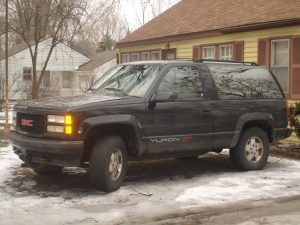
The market prices for trusted SUVs are returning to the norm, particularly in the used trucks segment. Possibly, that’s a hint to hold onto your Jeep for another couple years. And there is a clear reason for that. The tendency that was fairly clear over the last decade was that North Americans continued to buy huge and powerful SUVs and pick-up trucks, until the rampaging fuel prices made everyone think about downsizing, getting into the world of crossovers or even switching to more compact and lighter cars.
And why did North Americans traditionally opt for the huge and heavy gas-guzlingg

trucks in the first place? It must had been something that was a part of the culture, where the gas had always been super cheap, but the ability to haul trailers or heavy loads, or even just being able to impress others with the looks was more than just a commodity. Once one crosses from USA into Canada, there is a striking difference in the vehicles

Canadians drive. Though traditionally large pickups and SUVs abound, more money conscientious Canadians tend to prefer smaller cars, even to a point of choosing something sub-compact. And an even greater contrast anticipates one crossing the ocean and landing in Europe… The first thought often is, “all these cars… they are so miniscule, how do these people manage to get things done?” After a careful look, one discovers that the things for which Americans and Canadians use huge Dodge Ram or Ford F-series pickups can be easily accomplished by a modest Ford Transit van, and that Mercedes Sprinter with a 2.4L diesel engine can take more people and prove to be much more economical than lets say Ford Econoline with its gasoline monster powertrain.
So, why did I say in the beginning of the post that there is future and that the prices will go up? I think that despite the general

downsizing tendency and the escalating gas prices there is still room for big trucks and SUVs, despite their generally inferior fuel economy. The world will never be a planet carefully divided into even sectors with perfectly paved asphalt roads. There will be always places where no car or crossover be able to replace a well suited off-roader, be it in UN forces on a different continent in the desert or tundra, or even here, in the mountains, or places that are known for its unpredictable adverse weather conditions.

That’s probably the reason why trucks and SUVs have always held their ground better against depreciation, as opposed to cars and other vehicles. And the latest trend in the return of popularity of true off-roaders, I contribute to the fact that the climate is clearly becoming totally messed up, where the folks everywhere are witnessing abnormal weather changes. Even where I live, in Montreal, I see winters becoming hysterical and summers sub-tropical. And when you witness something like this, and the south of the continent is plagued by floods, forest fires, tornadoes and violent storms, people tend to hold a little longer to their trusted Jeep.
I actually feel that the market will cap. Most new SUV sales and auto general sales are subprime and the schemes of buy here pay here eventually will dump onto private markets. Yet, the real key is JK sales are right now a record high, and the JK makes all the others look bad. I think the and ljs are gonna tank meaning real offroad power at lower price points and a tied in collapse of “lesser” 4x4s market value. Why buy a Cherokee when a wrangler is in the same price zone? Then it’s why the wrangler when the Cherokee is near free. The best cure for high prices is high prices, and new car prices are disconnected from reality imho